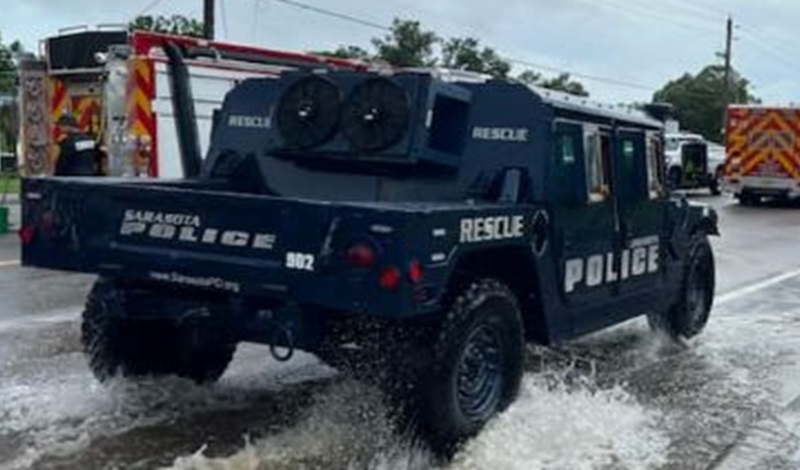
Despite anti-police sorts railing against military surplus equipment acquired by law enforcement agencies, folks plucked from perilous natural disasters by cops operating high-water rescue vehicles are grateful for a chance to live another day.
Florida’s hurricane season undeniably threatens life and tolls enormous property destruction.
It is entirely conceivable that if it were not for police departments and sheriff’s offices not deploying specialized equipment to navigate the treachery of powerful climate occurrences such as hurricanes, citizens expecting water rescues (among others) would be left stranded. No public safety official entertains the ludicrous notion of leaving citizens to fend for themselves with the odds stacked against them.
Debby Downer
Hurricane Debby pushed along the west coast of Florida on Sunday/Monday in early August 2024, dumping an astounding 10.75 inches of rainfall (National Hurricane Center data), quickly and unrelentingly flooding many coastal and inland jurisdictions. It continued with torrents…the meteorology measuring stick challenged by rising floodwaters.
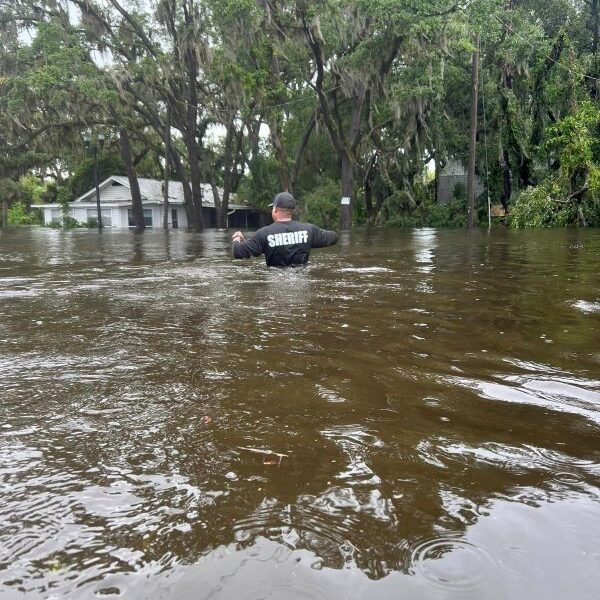
(Photo courtesy of the Sarasota Police Department.)
It is often said that no two hurricanes are alike. “Debby” showed us how much precipitation can accumulate when the storm moves through slowly, thus hovering while tremendous amounts of rain easily defeat drainage systems and the earth’s ability to drink quickly (or not).
On August 5, 2024, with Hurricane Debby bearing down on us, the elected officials in Sarasota chronicled the unprecedented rainfall: “Already, Sarasota has experienced historic rainfall. The National Weather Service reports that as of 11 a.m., the daily total was 11.56 inches.” A foot of rain may seem sustainable…but the ocean’s surge is the mighty exacerbator…
Sarasota was one Sunshine State city hugely impacted by torrents of pelting rain; its coastal presence was vulnerably battered by the unstoppable surge of water from the Gulf of Mexico.
Thankfully, the Sarasota Police Department was equipped with military surplus equipment that best serves the rescuers (police officers) and the public who rely on such resources when life looks bleak and natural disaster stares without blinking.
Notwithstanding naysayers who criticize law enforcement organizations for beefing up their array of specialized equipment to meet the needs of citizens confronting natural disasters, police executives wisely prepped for the events that may be outlandish yet possible.
Hurricane Debby’s pour-down made a beachy city mimic the Lost City of Atlantis. Instead of city buses rolling into designated Bus stops, police-owned amphibious vessels and airboats were showing up and plucking people from the brink/drink, transporting them from tragedy to safety.
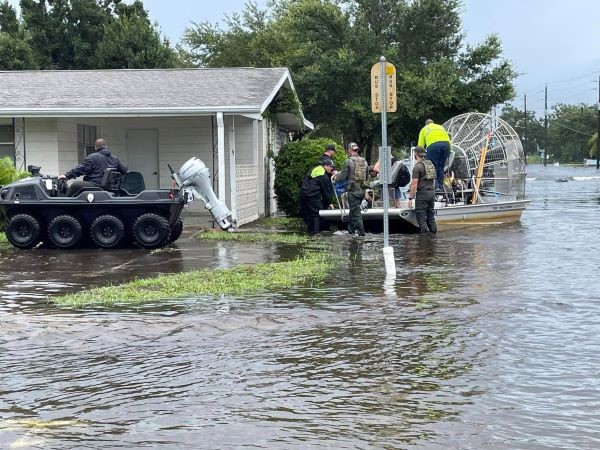
(Photo courtesy of the Sarasota Police Department.)
Although law enforcement entities were conducting search-and-rescue operations aboard military-style vehicles, the magnitude of Hurricane Debby and the influx of ocean surge she caused engendered the Florida National Guard assisting in military modes of transportation, rescuing trapped residents and removing fallen debris (namely trees) from roadways.
Loved ones living nearby were encountering some stressful situations in their home. With no power for over twelve hours and water seeping into their home, I ventured out to help mitigate their weather woes.
On my way there and back, I saw caravans of Florida National Guard troops headed south of us, to Sarasota and surrounding municipalities severely impacted by Debby’s fury.
I wondered if any of the usual crop of naysayers whose anti-military equipment ideologies —browbeating cops employing untraditional apparatus suiting search-and-rescue endeavors— were made mum.
The Lafayette County Sheriff’s Office, a modest force of law enforcement officers in North Florida, where Hurricane Debby’s trajectory was also projected, is not necessarily equipped with specialized machinery to navigate the effects left by hurricane fury.
Hence, they relied on contingents with the Florida National Guard to help LEOs patrol and manifest restoration in communities battered by wind gusts, pelted by chronic rain, and drenched by ocean surges that gave accelerated rise to rivers and (failed) retention ponds.
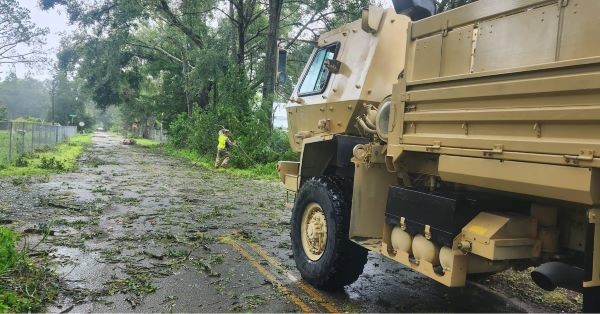
(Photo courtesy of the Florida National Guard.)
Per a Florida National Guard press release: “Soldiers from the 1-265th Air Defense Artillery Battalion conducted route clearing and debris removal on city streets in Lafayette County, FL, to assist in reopening the community on Aug. 5.
“The Florida National Guard continues to collaborate with the lead agency – the State Emergency Response Team – as needed and directed by the Governor.”
No “POLICE” markings on that deployed military-grade truck that serves a great purpose during dire circumstances…just like police incidents requiring utmost protection from bona fide violent bad actors while some onlookers harboring anti-cop sentiment condemn the use of such equipment despite their life-preserving and life-saving purposes. Sigh…
It is too bad the heroic efforts and courageous calculus displayed by law enforcement officers does not register with some folks who are seemingly unsettled, throwing stones despite the degree of tragedies cops seek to prevent. If they were in dire straits and cops showed up in military vehicles, would they forgo their seats for someone who was not prejudiced against public safety professionals?
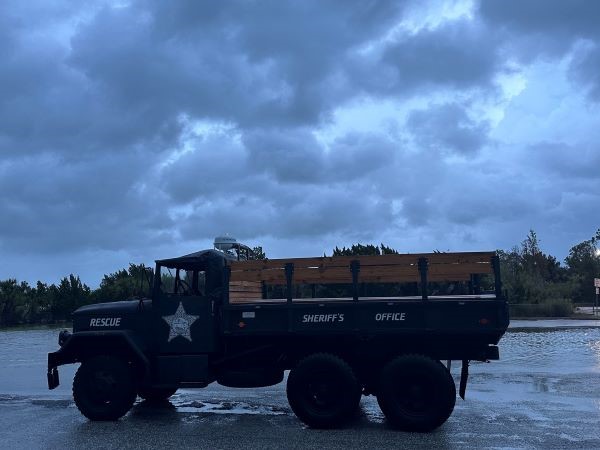
(Photo courtesy of the Hernando County Sheriff’s Office.)
One thing noticed lately is that police agencies using military surplus equipment have added the word “RESCUE” to the other markings denoting it is a law enforcement vehicle. I hope this helps police critics to come around and consider better senses instead of knee-jerking and castigating law enforcement modes of transportation ideally purposed for dangerous life-preserving feats.
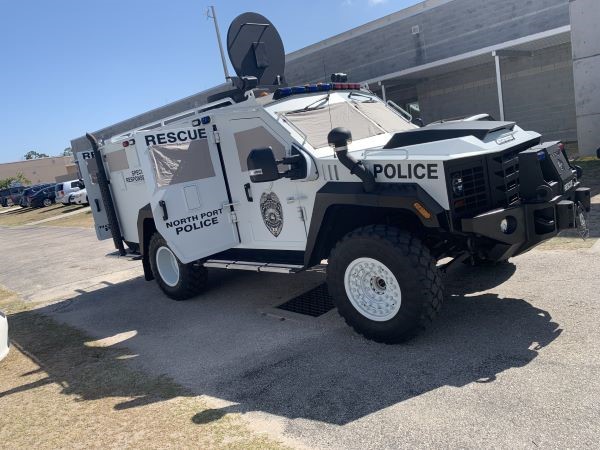
(Photo courtesy of the North Port Police Department.)
The North Port PD vehicle in the image above deployed with others in a caravan after its jurisdiction sustained Hurricane Debby’s fury and recouped enough to help elsewhere.
Also in the North Port Police caravan were several airboats, public works trucks, North Port Fire Rescue trucks, and a bevy of public safety personnel to help with Debby’s wrath, heading north to Sarasota whose city was walloped and severely flooded.
You see, a prior hurricane gave an unwanted facelift to the City of North Port, whose cops worked feverishly in search-and-rescue operations and restored their jurisdiction…with the help of Sarasota’s police force and fleet vehicles/boats.
“Returning some favors. Members of NPPD, [North Port Fire Rescue personnel], and @cityofnorthportfl Public Works Department are heading to the City of Sarasota to help our neighbors in need who are dealing with the impacts of Hurricane Debby,” said a North Port press release.
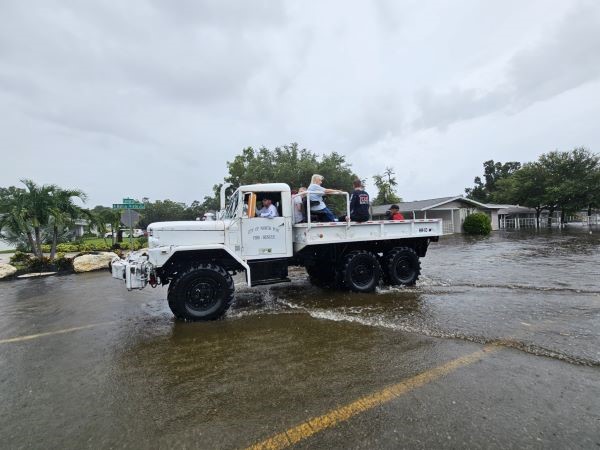
(Photo courtesy of the North Port Police Department.)
Returning the favor or not, public safety departments respond with what they’ve got, willingly, without hesitation, risking their lives for others’ salvation.
I’ve never heard of anyone rescued from the clutches of potential death whine about the intimidating-looking rescue vehicles that plowed through the muck and plucked them aboard to safety. Have you?
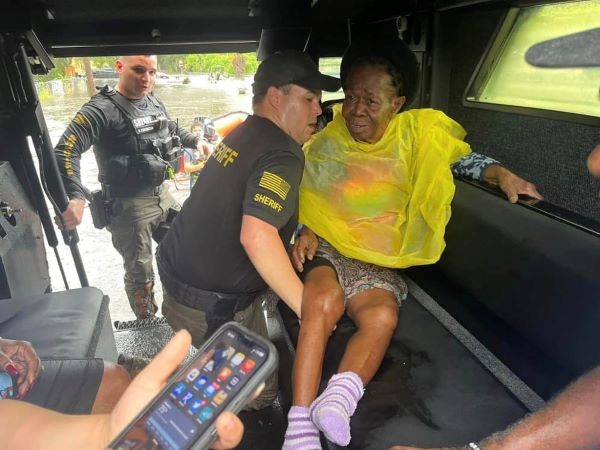
(Photo courtesy of the Orange County Sheriff’s Office.)
I can imagine that the thousands of automobile drivers taking the huge risk of motoring in obviously flooded areas found themselves conked out by the deep drink, with a water-drenched engine that may have seen its last journey during Hurricane Debby. Conversely, high-water rescue vehicles used by police agencies are ideal in situations that easily drown common cars.
As I final-edit this material, the National Hurricane Center is tracking another hefty storm brewing in the Atlantic —Tropical Cyclone Five— with the potential to mimic Hurricane Debby and the unprecedented flooding she deposited. I’m glad we have big military machines used by police to deploy as search-and-rescue vehicles after enormous natural disasters plow through the lands, imperiling citizens all over again.
Make a difference. Support the NPA.